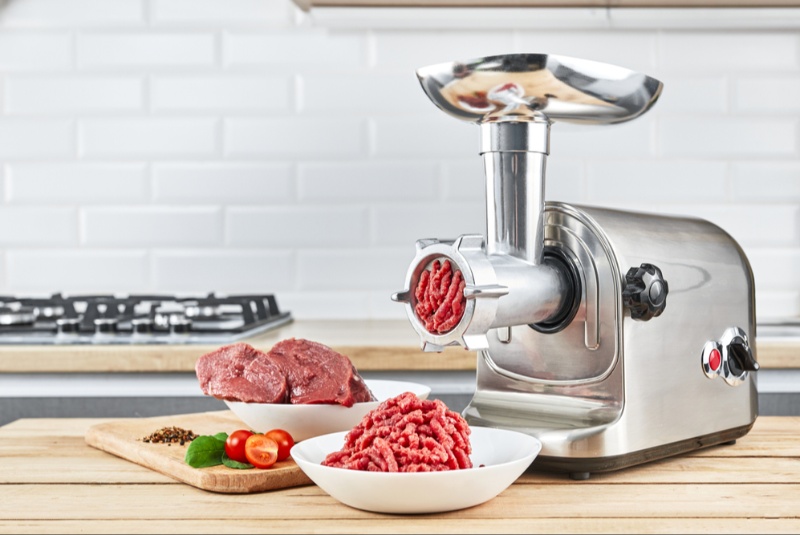When it comes to preparing meals at home, having the right tools can make all the difference. A quality meat grinder is one such tool, enabling you to grind your own meat for burgers, sausages, and more, ensuring freshness and flavor that store-bought ground meat can't match. Beyond freshness, grinding your own meat allows you to control the fat content and mix different types of meat for customized blends. Investing in a quality meat grinder not only elevates your home cooking but also offers a satisfying way to engage with your food from start to finish.
Key Considerations Before Purchasing a Meat Grinder
Before diving into the world of meat grinders, it's crucial to consider a few key factors. First, think about the quantity of meat you plan to grind. This will determine the size and power of the grinder you need. Additionally, consider the types of meat you'll be grinding. Tougher meats require a more robust grinder. Another important aspect is ease of cleaning; some grinders can be more challenging to clean than others. Lastly, consider your budget. Meat grinders come in a wide range of prices, and investing in a high-quality model can save you money in the long run by reducing the need for replacements.
Types of Meat Grinders: Manual vs. Electric
Meat grinders can be broadly categorized into two types: manual and electric. Manual grinders are operated by hand, making them suitable for occasional use or small quantities of meat. They're also more affordable and can be a good choice for those on a budget or with limited kitchen space. Electric grinders, on the other hand, are more powerful and efficient, making them ideal for grinding large quantities of meat quickly. They require less physical effort and can handle tougher cuts of meat with ease. Choosing between manual and electric depends on your grinding needs, budget, and how often you plan to use it.
Motor Power and Grinding Capacity
For electric meat grinders, motor power is a critical factor to consider. The power of the motor, measured in watts, directly impacts the grinder's ability to handle tough meats and large quantities. A higher wattage motor can grind meat more quickly and efficiently but may also come with a higher price tag. Grinding capacity, often indicated in pounds per minute, is another important consideration. A grinder with a higher capacity can save time, especially if you plan to grind meat in bulk. Balancing motor power and grinding capacity with your specific needs will help you choose the right grinder.

Durability and Construction Materials
The durability of a meat grinder is largely determined by its construction materials. Stainless steel grinders are highly durable and resistant to rust, making them a great option for frequent use. They're also easier to clean, which is a significant advantage. However, stainless steel grinders can be more expensive than those made with plastic or aluminum parts. While plastic and aluminum grinders may be more affordable, they typically don't offer the same longevity and may require more careful cleaning to maintain. Considering the material is essential when looking for a balance between durability and cost.
Ease of Use and Cleaning
A meat grinder that's difficult to use or clean can quickly become more of a hassle than a helpful kitchen tool. Look for grinders with straightforward assembly and disassembly processes, as this will make both use and cleaning much simpler. Some grinders come with dishwasher-safe parts, which can significantly reduce cleanup time. Additionally, consider the grinder's design and whether it comes with clear instructions. A user-friendly grinder will encourage more frequent use and ensure that the experience is enjoyable rather than frustrating.
Additional Features and Accessories
Many meat grinders come with additional features and accessories that can enhance their versatility and value. For example, some grinders include sausage stuffing tubes, allowing you to make homemade sausages with ease. Others might come with different grinding plates for fine, medium, or coarse grinds, offering more control over the texture of the ground meat. Additional features like reverse function can help clear jams quickly. While these extras might not be essential for everyone, they can provide added convenience and expand the range of recipes you can tackle.
Price vs. Quality: Finding the Right Balance
While it's tempting to go for the cheapest option, investing in a quality meat grinder can save you money and frustration in the long run. Higher-quality grinders are more durable, efficient, and often come with better warranties. That said, it's important to find a balance that fits your budget. Consider how often you'll use the grinder and for what purposes. If you plan to use it frequently or for heavy-duty grinding, investing in a higher-quality model is advisable. However, for occasional use, a mid-range grinder might suffice.
User Reviews and Recommendations
One of the best ways to gauge the quality and performance of a meat grinder is through user reviews and recommendations. These can provide insights into how the grinder performs in real-world settings, its durability over time, and any potential issues you might encounter. Look for reviews that detail both the positives and negatives, as they tend to be more balanced and informative. Additionally, culinary forums and social media groups dedicated to cooking and kitchen equipment can be valuable resources for recommendations and tips from experienced users. Paying attention to the feedback from multiple sources can help you make a well-informed decision and choose a meat grinder that meets your expectations.
Investing in a quality meat grinder is a step toward more creative and controlled home cooking. Whether you're making ground meat for burgers, sausages, or experimenting with your own meat blends, a meat grinder offers a fresh, flavorful alternative to store-bought options. By carefully considering your needs and the factors outlined in this guide, you can select a meat grinder that's a perfect fit for your kitchen. Embrace the art of meat grinding at home and discover the difference in taste and quality that comes with making your ground meat.

